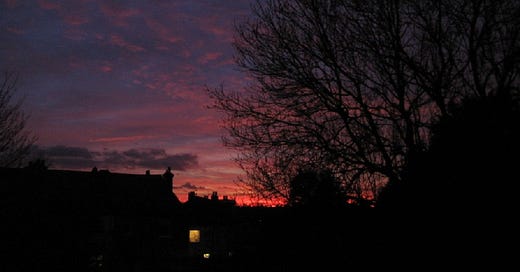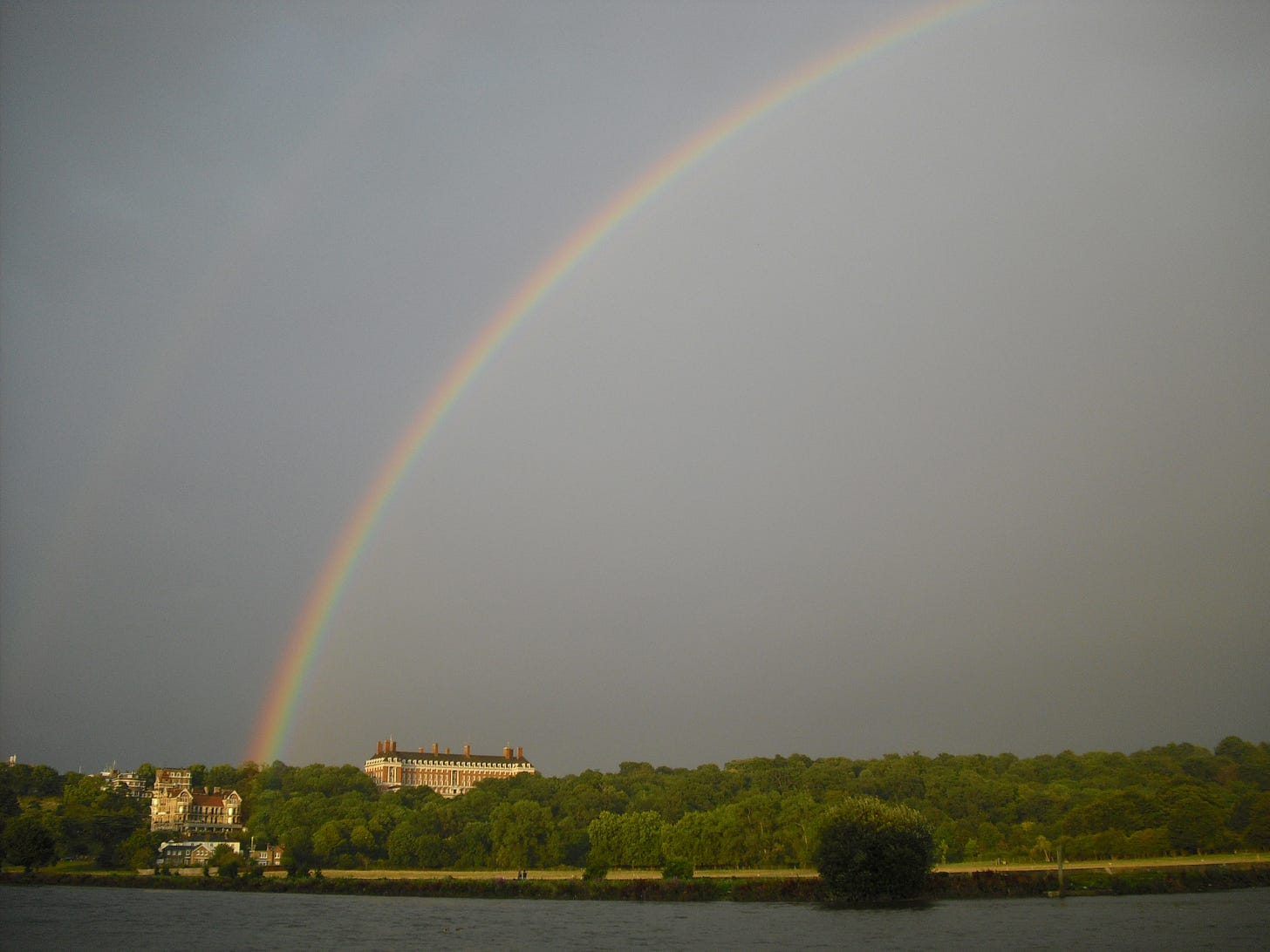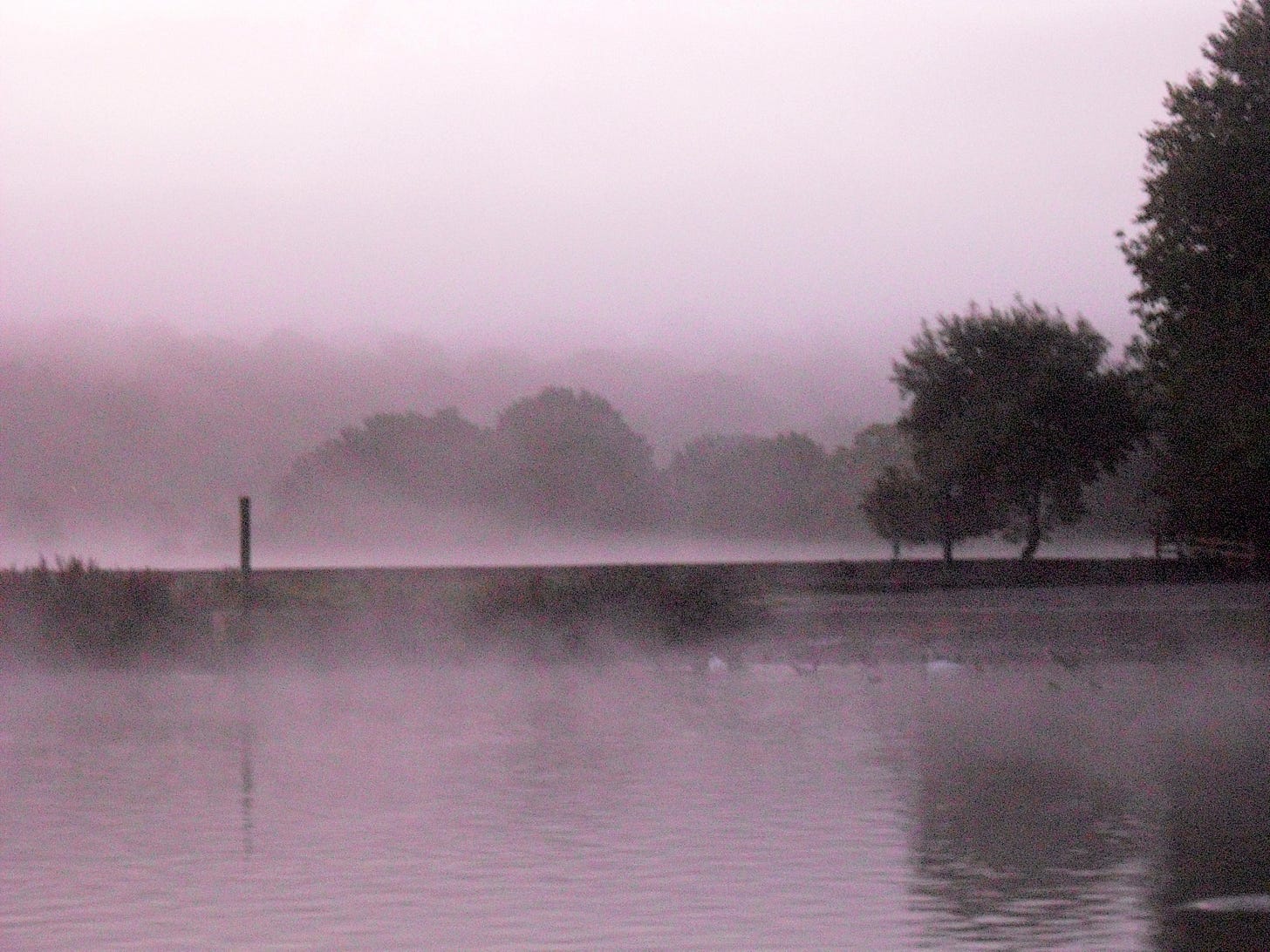Seemingly endless rain is lashing down on old England as my friends in New England write describing snowdrifts many feet deep in their ‘once in a hundred years’ storm. I am away in London for New Year, spending the evening peacefully alone by choice, reading, meditating and bringing you this piece.
Audio version
A year ago I wrote to my friend Dougald, having just found words for a rebellion in me against the disdain I sensed in descriptions of ordinary people, (especially ordinary women), in much contemporary political writing, with which I might otherwise have sympathy. It still stands. Disdain is the barely-polite face of dehumanisation. This New Year I reaffirm my openness to unsolicited friendly greetings, ‘pointless’ sentences exchanged about looming clouds, shared laughter and almost talismanic weather forecasts with strangers as we duck into shop doorways to avoid the next deluge of a coastal Sou’westerly. Good weather to you, both inner and outer, and Happy New Year!
I recently unsubscribed from a once-excellent Substack newsletter, whose strapline was ‘Everybody talks about the weather – we don’t.’
Don’t get me wrong, I know this meant that they didn’t do small talk, were serious, didn’t waste words. And for months I was often inspired by the calls for solidarity, mutual aid and tips for organising. Later, it tasted sour when the newsletter called out women as ‘terf’s for reporting that they were being doxxed, harassed and hounded for asserting that their physical sex might have something to do with the FGM / rape / coercion, etc, that they had suffered. For good reason, I unfollowed the writing, not wishing to add contemporary witch hunts to the daily dose of woe the media brought me.
But that’s not really the heart of why I left at all, when I look back, it was brewing right from that very first strapline.
So what is it that we are talking about, when we talk about the weather? Why, the world over, except in the enclaves of privilege, concrete and aircon that pass for high-end urban human habitations, is ‘the weather’ precisely what any ordinary person first mentions to another? As a form of simple hospitality, a few words about the weather cannot be beaten, they show interest, friendliness, openness to conversation. They put people at their ease. They show we are not above everybody else. Importantly, from an embodied practice perspective, they are a conspiracy (literally - ‘breathing together’) to show that we are in the same boat. That everyone is subject to the same rain, sunshine and gusts of wind. They are also, like the bared teeth of a smile, the small bow, or proffered handshake; reflexive, culturally nuanced, ancestral ways of relaxing a stranger by showing we mean no threat.
But if you do not live in the same embodied situation as most people, when you are cossetted in your climate-controlled apartment, brought all your food and shopping at the click of a button, when your thoughts are mediated through screens, then of course you would look down upon those of us whose lives are often spent working out in the rain, or under a fierce sun. You are not in the same boat as your elderly neighbour for whom inclement weather is the difference between having any fresh food today, or indeed, any company. You are not in solidarity with the person who has just taken away your trash before dawn this winter day. You are not an ally of the woman wanting to walk home safely, but who can’t hear footsteps behind her because she needs her hood up against the driving sleet.
When we began to talk about the weather, around about the time we developed speech, I imagine, very little would have been as important as one’s immediate surroundings, the quality of light, precipitation, the time of year. Everything we evolved to do together: to hunt, forage, sing, cook, tell stories, share news, make alliances, survive natural disasters, was done in the context of real outdoor physical bodily experience. When we dismiss talk about the weather, as we do ‘gossip’ and ‘old wives tales’, all we do is show our hubris, our hypertrophied left hemispheres controlling our mouths, like automatons. For the Machine and its human servants there are no seasons and no atmospheric conditions. Only opinions blow, only disapproval rains down. The real is unreal, and anyone who discusses something as pointless as things as they materially are, and how environmental forces physically and psychologically affect us, is a sad anachronism huddling at the base of their shining impermeable tower.1
Today the weather here was cold, clear and bright. I didn’t have a chance to get out due to writing that had to be finished. And now, after only one day where I mainly looked at screens and did not feel the air on my skin, nor talk to the cheese shop keeper about the sunshine or the out-of-season spring-like birdsong in the gardens, I feel a little ill. Properly cranky, untuned to my human and non-human neighbours, up here in a first floor flat, even though I am fortunate to overlook limes and chestnuts outside the window. Like the denizens of ‘The Machine Stops’ in E M Forster’s shockingly prescient 1909 short story, people turn in on themselves, and then against others, for lack of real life. Sometimes I do, too.
And in ‘real life’ I include weather. Inner, outer, atmospheric, communally experienced, nuanced, metaphorically rich. Free. Unmediated. When we talk about the weather, we practice the vital kindnesses, considerations and accommodations that we desperately need so as not to come to blows about a thousand tiny things. We learn instantly the disposition of another soul, without any need for prying or taking offence, and with a hundred subtle ways to make a gentle exit, or to deepen the communication. To say ‘we don’t talk about the weather’ is to say we are above everyday convivial speech, to brag about disembodied living in the Hubriscene Age, adrift from humble moorings in reality, from help, and ironically, at much greater risk from genuine ill weather.
Here is a great recent dramatized audio version of The Machine Stops produced by the BBC starring Tamsin Greig, lasting 56mins.
This week’s good thing is to share with you some more beautiful music. But it is also a sad thing, as in November 2022 a huge musical hero of mine, Mimi Parker, died. Mimi was the vocalist, songwriter and drummer of renowned US band Low. Her unique voice, exquisite harmonies and languorous phrasing stood out starkly from the more abrasive styles of her indie contemporaries. Sometimes it was as though Karen Carpenter was singing with The Cure at their most sparse and melancholy. The last big gig I attended, before Covid changed all our lives, was a bone-shakingly bassy concert Low played for Robert Smith’s Meltdown at the Royal Festival Hall. It was the only gig I ever attended alone, and I walked along the Thames before the train ride back to my boat, singing their encore song ‘Silver Rider’ to myself to keep some of the night’s atmosphere with me. The couple at the heart of the band, Mimi and her husband Alan Sparhawk, were (unusually for a rock band) open about their Mormon faith and many of their songs overtly refer to Christian themes: recalling the life of Jesus in ‘If You Were Born Today’, the role of Judas in ‘Murderer’, and an entirely non-twee album of songs for Christmas. If you don’t know their rich, varied music you could start almost anywhere, but the links in this paragraph will take you to some good places to start.
Clearly, I have a little work to do on my own ‘not being disdainful’ tone.










Thank you for this down-to-earth take. I use the term deliberately, because excluding the weather is another form of excluding the Earth, and in the end our rejoicing or sheltering from it is a participation in her life cycle. I was always fascinated how the weather is such a common ground for conversation, like a species memory that it is a vital concern for everyone's survival.
Milder here this week